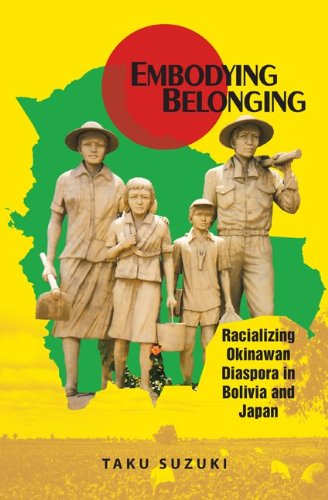(Ebook) Embodying Belonging: Racializing Okinawan Diaspora in Bolivia and Japan by Taku Suzuki ISBN 9780824833442, 0824833449
Embodying Belonging is the first full-length study of a Okinawan diasporic community in South America and Japan. Under extraordinary conditions throughout the twentieth century (Imperial Japanese rule, the brutal Battle of Okinawa at the end of World War II, U.S. military occupation), Okinawans left their homeland and created various diasporic communities around the world. Colonia Okinawa, a farming settlement in the tropical plains of eastern Bolivia, is one such community that was established in the 1950s under the guidance of the U.S. military administration. Although they have flourished as farm owners in Bolivia, thanks to generous support from the Japanese government since Okinawa’s reversion to Japan in 1972, hundreds of Bolivian-born ethnic Okinawans have left the Colonia in the last two decades and moved to Japanese cities, such as Yokohama, to become manual laborers in construction and manufacturing industries.Based on the author’s multisited field research on the work, education, and community lives of Okinawans in the Colonia and Yokohama, this ethnography challenges the unidirectional model of assimilation and acculturation commonly found in immigration studies. In its vivid depiction of the transnational experiences of Okinawan-Bolivians, it argues that transnational Okinawan-Bolivians underwent the various racialization processes―in which they were portrayed by non-Okinawan Bolivians living in the Colonia and native-born Japanese mainlanders in Yokohama and self-represented by Okinawan-Bolivians themselves―as the physical embodiment of a generalized and naturalized "culture" of Japan, Okinawa, or Bolivia. Racializing narratives and performances ideologically serve as both a cause and result of Okinawan-Bolivians’ social and economic status as successful large-scale farm owners in rural Bolivia and struggling manual laborers in urban Japan.As the most comprehensive work available on Okinawan immigrants in Latin America and ethnic Okinawan "return" migrants in Japan, Embodying Belonging is at once a critical examination of the contradictory class and cultural identity (trans)formations of transmigrants; a rich qualitative study of colonial and postcolonial subjects in diaspora, and a bold attempt to theorize racialization as a social process of belonging within local and global schemes.
*Free conversion of into popular formats such as PDF, DOCX, DOC, AZW, EPUB, and MOBI after payment.


